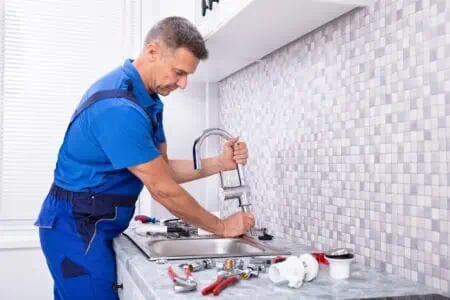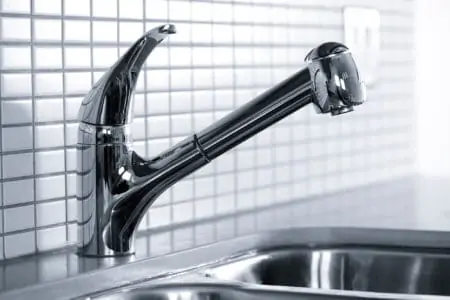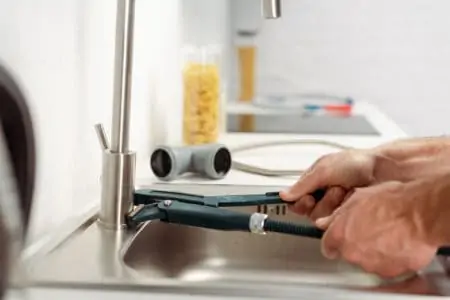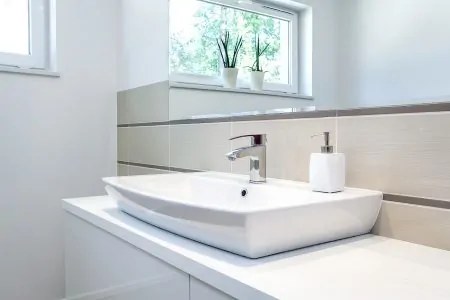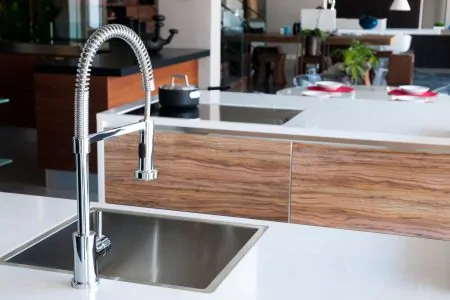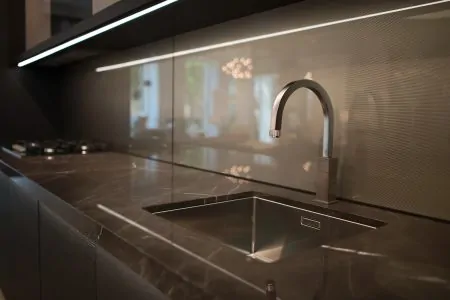Your kitchen faucet is at the hub of your kitchen. It fills your kettle, washes your dishes, washes your hands, and helps you cook and clean. But what are the costs to replace a kitchen faucet?
We take a detailed look at the cost to install a kitchen faucet and the factors determining the price you pay.
Key Takeaways
- Average cost to install a kitchen faucet in the USA is $500, with a price range of $300 to $800.
- Factors affecting the price include faucet type, material, professional vs. DIY installation, and location.
- Some common faucet types are basic, mid-price, premium, and luxury, each with different price ranges and features.
- Labor costs for installation can vary from $45 to $90 per hour depending on the professional hired.
- Average Cost to Install a Kitchen Faucet
- Breakdown of Kitchen Faucet Installation Costs
- Cost to Install a Kitchen Faucet by Zip Code
- Factors Affecting Kitchen Faucet Installation Costs
- Do You Need a Plumber to Replace a Kitchen Faucet?
- How to Save Costs When Installing a Kitchen Faucet
- Tips for Picking a New Kitchen Faucet
- FAQs
- Kitchen Faucet Final Thoughts
Average Cost to Install a Kitchen Faucet
The national average faucet installation cost runs at $500. However, several factors influence the price. The average price range is $300 to $800, although, for the luxury end, you could spend $2,000.
Prices vary by Zip code, and you generally pay more in the city than in the countryside because living costs are higher in densely populated areas. Other price-changing factors include the type of faucet and where it’s located.
Breakdown of Kitchen Faucet Installation Costs
Knowing what things cost and where your dollars are going is crucial, especially if you want to keep a check on the budget.
Type of Faucet
The faucet type you choose has one of the biggest influences on the overall bill you pay. Some people have a tight budget, while others have deeper pockets.
- Basic faucets cost between $30 and $60. These models are typically plastic or steel with single or double handles.
- Mid-price faucets cost $60 to $160 depending on the neck size and integrated sprayer.
- Premium taps cost $160 to $400. These have several features like hands-free operation and multiple sprayer settings.
- Luxury faucets tend to be custom-designed and contain all the features you could want for a modern kitchen.
Labor Cost
Labor costs vary by Zip code and who carries out the work. It ranges from a local handyperson to professional installation from a licensed plumber.
- $90 to $260 for a basic installation-only cost.
Alternatively, you may be quoted a price-per-hour rate:
- $45 to $80 per hour for a handyman.
- $60 to $90 per hour for a licensed plumber.
- $40 to $75 per hour for an apprentice or trainee plumber.
Take Note
If you opt for the DIY approach, there are no labor costs to consider.
Additional Plumbing Supply Costs
You will need to factor in these supply costs if you do the installation yourself. If you hire a pro, they will include these sundries in the final quote.
- $15 to $50 for a new water supply line.
- $10 for plumbers putty or Teflon tape to seal the connection to reduce leak risks.
Location of the Faucet
Where you mount the faucet makes a difference to the price. If the installation is more complicated, your plumber will charge accordingly.
- Wall installation will cost between $500 and $1,500.
- Countertop installation will cost between $300 to $800.
Removal of the Old Faucet
Before installing the new faucet, the old one will need to be removed. Some services include disposal of the old faucet, which increases the price you pay.
- Removal (including labor and materials) costs between $65 and $125.
- Removal (including labor and materials) and disposal cost $85 to $165.
Take Note
If you remove a kitchen faucet only, you do not need permits. However, you will need to check your local plumbing code if you decide to relocate the sink.
Cost to Install a Kitchen Faucet by Zip Code
Why does the Zip code make a difference with kitchen faucet installation costs? Living costs vary between locations, and that affects the price you pay. Here’s a breakdown by Zipcode:
| Location | Price |
| Washington, D.C. | $190 to $370 |
| New York | $185 to $400 |
| Seattle | $240 to $535 |
| Portland, OR | $195 to $395 |
| Los Angeles | $150 to $345 |
| Dallas | $170 to $330 |
| Denver, CO | $185 to $420 |
| Austin, TX | $165 to $325 |
| Chicago | $185 to $365 |
| Charlotte, NC | $160 to $370 |
Factors Affecting Kitchen Faucet Installation Costs
So, we’ve looked at several factors that influence how much it is to install a kitchen faucet, but there are other reasons why prices vary.
Faucet Type
With several designs to choose from, it’s no surprise that the model you choose directly impacts the price you pay.
| Faucet Design | Price Range (Material Only) |
| Single-hole | $50 to $1,000 |
| Single-handle | $50 to $1,000 |
| Pull-out | $125 to $300 |
| Widespread | $150 to $500 |
| Pull-down | $150 to $1,000 |
| Touchless | $160 to $600 |
| Pot filler | $200 to $1,200 |
| Gantry | $250 to $4,000 |
| Bridge | $300 to $800 |
Single-Hole Faucets
These taps are stylish and give your kitchen a clean, crisp look. The hole refers to the number of drill holes you need to install the faucet. These faucets are typically monobloc, which means the assembly is housed in one block.
Some have sprayers, while others do not. They operate from a side handle for the hot and cold function, but some high-end models can be touchless.
Price range: $50 to $1,000.
Single-Handle Faucets
Single-handle faucets have (wait for it) a single handle (did you guess right?). The handle is typically mounted on the side of the tap, like the monobloc variety, while others have a separate handle on the counter.
Price range: $50 to $1,000.
Pull-Out Faucets
Pull-out faucets have a detachable spray head that typically extends from the top of the tap. They usually have a single hole and lever, so they require minimal cutting to install. This is the one for you if you want a compact version of the pull-down faucet.
Price range: $125 to $300.
Widespread Faucets
These taps are traditional in appearance, making them perfect for anyone replicating a period kitchen. Widespread faucets have a more expansive spout that delivers a broader water flow. They are sometimes called eight-inch or three-hole spreads because of their size.
They consist of a spout and two handles located eight inches apart. Luxury versions often have a separate pull-out spout mounted next to the water faucet, which involves drilling a fourth hole.
Price range: $150 to $500.
Pull-Down Faucets
Pull-down faucets are the bigger cousins of the pull-out models. They have a single stem and lever with a gooseneck spout, unlike the pull-out fixture. These faucets are taller than pull-out taps and create more impact in the kitchen as a focal point.
Price range: $150 to $1,000.
Touchless Faucets
Imagine controlling your faucet with the power of your mind. That would make you a superhero, right. Okay, so while touchless kitchen faucets are cool, they are not “Marvel Universe” cool.
Wave your hand below the spout, and the water miraculously starts flowing. It works by sensors, although some models have a foot pedal operation. However, if you opt for the latter, expect a heftier plumber’s bill.
Price range: $160 to $600.
Pot Filler Faucets
Pot fillers are a specialist addition to your kitchen. They are ideal for those people lacking the strength to move and lift pots. They install directly above your cooker top so you can fill heavy pots without carrying them to the sink.
They fold or swing into position and can be tucked out of the way when not in use.
Price range: $200 to $1,200.
Gantry Faucets
Okay, we are now getting into the realms of “semi-pro” faucets. A gantry faucet consists of a separate pull-down sprayer with the reach and control of a standard spout but with more power.
They are ideal for dislodging stubborn food stains, hence why you see them in professional settings.
They come as a bridge and widespread varieties for faster water flow, but they take up more space than standard faucets. They may not be the ideal choice if you have a small kitchen.
Price range: $25 to $4,000.
Bridge Faucets
Bridge faucets are more traditional in style. They consist of hot and cold pipes that meet in the center, where the spout sits. They are the sort of faucets found in period or farmhouse kitchens.
Price range: $300 to $800.
Faucet Brand
Which brands deserve your attention, and which names offer the best value? Let’s take a look at some household names:
| Brand | Price Range |
| Delta | $85 to $400 |
| Kohler | $170 to $800 |
| Moen | $100 to $400 |
| Grohe | $250 to $1,000 |
| American Standard | $60 to $540 |
You can see from the handy table above that American Standard, Delta, and Moen are the budget to mid-price brands. So, if you have a tight cost base, maybe you should focus on those brands.
If you are looking at the luxury end, think Kohler and Grohe. While they make lower-priced faucets, their range is more extensive at the premium end of the market.
Flow Rate Control
Flow rate is crucial, especially if you do a lot of cooking and need to shift stubborn stains. It also helps when filling large pots and washing your hands. You are more likely to get flow control on more expensive faucets like the pull-down and gantry models.
Repairs
The cost of repairing your faucet needs to be considered, especially if you end up replacing the entire thing because it’s cheaper. Does the faucet have repairable parts, or is it a sealed unit that comes in one piece?
If you’re spending big bucks, you want the faucet to last the distance, so knowing you can repair rather than replace it makes a difference. A washer costs dollars compared to hundreds for a new faucet.
Faucet Material/Finish
Faucet material makes a huge difference to the price you pay. From budget taps to luxury models, let’s look at your options.
Chrome Faucets
Chrome is one of the most common faucet finishes. It is applied via electroplating to the material beneath, but it must meet restrictions and regulations.
It offers a clean and contemporary finish and is non-reactive (won’t contaminate food), making it ideal for most applications.
Price range: $40 to $1,500.
Plastic Faucets
If you want a color-matched faucet, like white or black, you will need to choose a plastic model. You can buy powder-coated taps, but plastic is more hard-wearing.
FYI
If you opt for a spray finish on your plastic faucet, be aware that it will peel off in time, leaving you with a worn tap.
Price range: $80 to $500.
Bronze Faucets
Bronze is a luxury finish and comes in several styles. You can get aged bronze, golden yellows, and an almost-black finish.
Price range: $65 to $800.
Stainless Steel Faucets
Stainless steel is the other most popular style of kitchen faucet; a firm favorite because of its anti-corrosion qualities. It withstands the rigors of moisture better than most other finishes. Stainless steel matches the look of stainless steel sinks and other kitchen appliances.
Try brushed steel as an alternative to high-shine stainless steel for a softer appearance.
Price range: $100 to $1,000.
Nickel Faucets
Nickel gives a more subtle appearance than chrome or stainless steel. It is available in brushed, polished, or satin finishes. Nickel is not as hard-wearing as other faucet finishes because it reacts to moisture.
Price range: $90 to $1,600.
Other Faucet Finishes
- Brass: $100 to $2,000 average price range.
- Zinc: $150 to $800 average price range.
- Copper: $175 to $1,000 average price range.
Extra Features
The more money you spend, the more features you expect. Look for touchless control, instant hot water, pull-down attachments with a sprayer, and adjustable sprayers.
Just bear in mind that these additional features mean there is more to malfunction compared to a basic faucet.
Do You Need a Plumber to Replace a Kitchen Faucet?
It depends on the complexity of the installation. Fitting a standard faucet is simple enough, but added features like filters, toe operation, and touchless controls make it more challenging.
And if you are changing the sink and the tap, the workload increases. When adding additional features like garbage disposal, you need to call a pro to certify the work.
Doing the work yourself will only cost you the price of the replacement faucet, but calling the pros means you need to factor in labor rates. You can easily spend $90 per hour hiring a licensed plumber.
You can call in a handyperson for $45 to $80 per hour, but you are still adding a chunk of money to your faucet installation costs.
How to Save Costs When Installing a Kitchen Faucet
We all like saving money, so what things should you consider when installing a new kitchen faucet. What are the simple things you can do to trim costs?
Remove the Old Faucet Yourself
Why waste money getting your skilled plumber to remove the old faucet. Time is money, so the longer it takes to complete the task, the more it costs you.
Shut off the water supply and remove the faucet yourself. That way, all your plumber has to do is install the new one.
Supply the New Faucet
Whether it’s a new faucet or one reappropriated from an old bathroom remodel, supplying the tap is a sure-fire way to trim costs. If you ask your plumber to provide the faucet, they will happily do so at a price.
As long as the new faucet is compatible with what you want, you can pick one up from the DIY store at a fraction of the price. Who knows, you may even get an end-of-line or discounted model?
Clear the Work Area
Clearing the work area, like under the sink, speeds up the process and helps your plumber get straight to work. It also makes it easier to perform the installation, again speeding up the process.
Tips for Picking a New Kitchen Faucet
When choosing a new faucet, it can be confusing to know what you want and why. What things should you be looking for? Let’s find out.
Get the Right Finish
If your sink and appliances are stainless steel, pick a faucet that matches. If you try to mix and match, it will stand out like a Red Sox fan at a Yankees game.
Also, choose a finish that will last the distance. Powder-coated black taps are notorious for chipping and flaking. If that happens, it will look messy, leading to you replacing the entire kitchen faucet at a significant cost.
Get the Size Right
Sizing your new faucet is crucial because if it doesn’t fit, you will need to replace it. This applies to height as well as width. A single-hole faucet with a single handle is the best option for limited space.
If you have the luxury of space, try a gantry or widespread tap.
Go Like-for-Like
Finding a faucet that best matches your existing one is always the cheapest policy. It means you can slot it right into existing pipework with minimal fuss and expense. Choosing a bridge faucet when you previously had a single-hole model will incur lots of additional work.
It may also be the difference between you doing the work or calling in a pro.
FAQs
Kitchen Faucet Final Thoughts
Whether you are replacing your kitchen faucet for vanity reasons or necessity, it can improve the functionality of your kitchen immensely. From pull-down faucets to traditional bridge types, there is a style and finish to meet your exacting demands.
Hopefully, we’ve answered the question, “how much to install a kitchen faucet,” leaving you better informed than at the start. Go on. What are you waiting for?
You know you want a new kitchen faucet.
